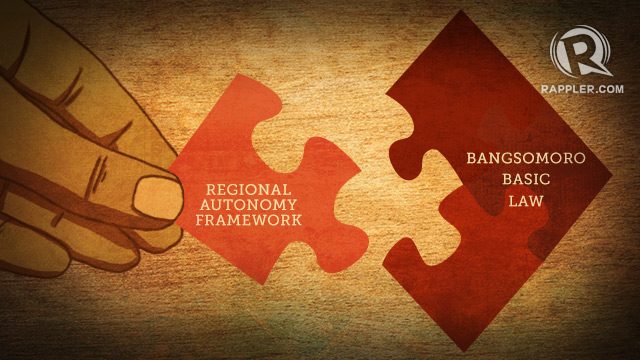SUMMARY
This is AI generated summarization, which may have errors. For context, always refer to the full article.

In a few months, millions of Muslim Filipinos in Mindanao will be struggling with this question: “Do you approve of the Bangsamoro Basic Law?”
But this plebiscite question is not really a straightforward “yes” or “no” proposition. Indeed, it can be argued that there is actually no “no”option here.
For Filipinos residing in the proposed Bangsamoro territory, a “yes” means being in favor of the creation of the expanded regional autonomy regime. However, a “no” not just means a rejection of the Bangsamoro Basic Law (BBL). Essentially, it also signifies the acceptance of being stuck with the untenable Autonomous Region in Muslim Mindanao (ARMM).
Hence, both choices actually denote a “yes” to the regional autonomy model sanctioned in the Constitution. Curiously, there is no clear explanation why the decentralized system established by the Local Government Code (LGC) has been completely removed from the equation.
The Constitution calls for the creation of an Autonomous Region in Muslim Mindanao. But this does not mean Filipino Muslims are automatically bound by this particular local autonomy regime. In fact, the Igorots of the Cordillera have twice rejected the regional autonomy model. Local governments in this region thus carry on with the business of governance under the auspices of the LGC.
So are Muslim communities in Mindanao really better off being under the regional autonomy framework? Let me elaborate two features in the BBL, the currently undisturbed version, that invites a rethinking of this conventional view.

The first one pertains to the considerable expansion of fiscal autonomy found in Article XII. Specifically Section 9, which transfers the authority to collect national taxes such as capital gains tax, donor’s tax, and estate tax to the regional government when all taxable elements are within the Bangsamoro territory.
A vital feature of this new arrangement is that the Bangsamoro government gets the entire amount generated from the enhanced revenues measures. Section 12 then just authorizes the projected Bangsamoro Parliament to enact a law to detail the share of constituent local government units.
This proposed innovation would likely invite objections on constitutional grounds. However, I only want to raise the alarm on more rudimentary concerns – such as why should the regional bureaucracy get full control of the revenues collected? And why not institute a fixed share in the BBL for local governments? Sadly, there are no clear answers on this score as well.
The second feature of the BBL worth looking into are Sections 20 and 22 of Article XIII on the authority to manage and exploit coastlines and other inland water bodies given to the Bangsamoro government. Once again the relevant communities are simply afforded an “equitable share” in the generated revenues collected by the regional bureaucracy from this undertaking.
This proposed fiscal clout is highly controversial because it deprives the local communities of their real mandated share. The overarching rule in the sharing of revenues from natural resources is found in Section 7 of Article X of the Constitution which reads as follows:
“Section 7. Local governments shall be entitled to an equitable share in the proceeds of the utilization and development of the national wealth within their respective areas, in the manner provided by law, including sharing the same with the inhabitants by way of direct benefits.”
The critical condition here is that the proceeds from the use of the natural assets must be shared “with the inhabitants by way of direct benefits.” This means the Constitution mandates that the revenues “generated though exploration, development or utilization of natural resources” found in a particular territory must be translated into roads, hospitals, schools and other facilities that will be directly enjoyed by the corresponding community.
The BBL seems to have sidestepped this Constitutional requirement. The Bangsamoro Parliament is now privileged under the BBL to determine the “equitable share” of local governments from the revenues coming out of natural resources within their respective communities.
Effectively therefore, whoever holds the power in this contemplated regional government has sole and primary control over this particular revenue source. Correspondingly, compliance with the Constitutional directive of sharing this money “with the inhabitants by way of direct benefits” has become subject to political wrangling. The very scenario the Constitution was meaning to avoid.
The aforementioned aspects of the BBL thus appear to contradict the constitutionally mandated autonomy of local governments. Indeed, there is a palpable underlying bias in the BBL that local governments in Muslim Mindanao are incapable of exercising the enhanced powers themselves, thus making a regional bureaucratic structure necessary.
Therefore, as Congress deliberates on the BBL, perhaps lawmakers should also wrestle with the issue that a regional governance infrastructure can undermine the autonomy of local governments.
This is indeed a dire political reality evident in the ARMM. An arguably unexpected aberration that has unravelled in the region since its creation in 1989 which could have contributed significantly to its disappointing status as the poorest in the country.
Interestingly, the Igorots of the Cordillera have, so far, avoided the said institutional handicap. Thus allowing local communities in the region to enjoy the economic benefits of tourism hot spots like Sagada, Banaue and Baguio. This sadly cannot be said about the natural wonders within the ARMM.
Let me be clear however that the expansion of the scope and depth of political and fiscal autonomy is not objected to here. But the perceived strategic advantage of lodging the expanded powers exclusively with a regional bureaucracy needs to be challenged.
And given that another regional government, however improved autonomy-wise, seems likely to hinder the development of local Muslim communities in Mindanao, then the suggestion here to include in the BBL the option to get out of the regional autonomy framework should not be easily dismissed by Congress. – Rappler.com
Michael Henry Ll. Yusingco, LL.M is a practicing lawyer. He is the author of the book, Rethinking the Bangsamoro Perspective. He researches on current issues in “state-building, decentralization and constitutionalism.”
Add a comment
How does this make you feel?
There are no comments yet. Add your comment to start the conversation.